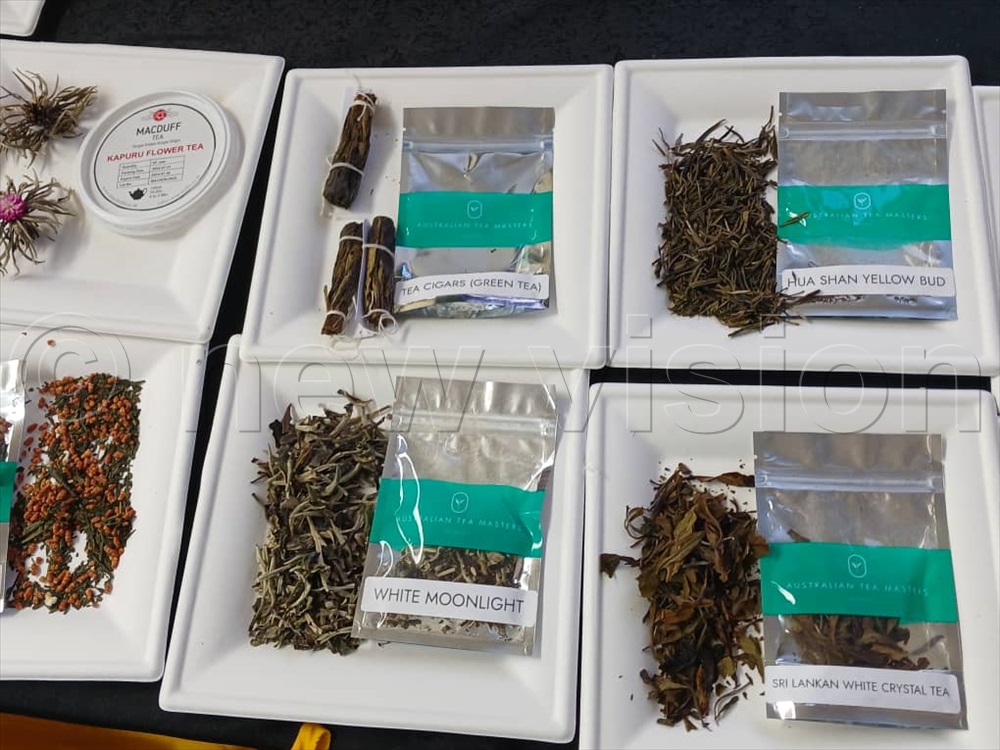By Nelson Mandela Muhoozi
Two Ugandan tea brands have received awards for their innovation and quality at the inaugural African Specialty Tea Conference and Expo in Kenya.
The May 22-23, 2024, Nandi Bears Club in Nandi County, event organised by the Purple and Specialty Tea Association of Kenya (PSTAK), highlighted the potential of African specialty teas on a global stage.
The conference drew a diverse group of participants, including government officials from Kenya, Uganda, Tanzania, Rwanda, Zimbabwe, Malawi and Mozambique, as well as certified international tea testers.
Over 30 Ugandan tea farmers attended, eager to learn from Kenya’s advancements in tea quality and specialty tea cultivation.
Ugandan tea brands shine
Ugandan tea brands stood out during the conference, earning praise from international experts.
Maclean Mutungi Kyamutetera, producer of Mackie Organic Tea from Western Uganda, was recognized in the white tea category for her commitment to quality and the specialty tea trend.

Mutungi received cash prizes and certificates from international tea experts, securing the second position in the emerging tea producers’ category.
Similarly, producer of Tooro Alpha tea Sarah Basasa excelled in the green tea category, achieving third place. Mozambique secured the first position in this category.
Praise for Ugandan teas
Founding Director of the European Specialty Tea Association Tay Bernadine lauded the quality of African teas at the awards gala.
“Your teas were better, if not equal, to all other teas worldwide,” she said. Bernadine emphasized the untapped potential of African teas and the need for storytelling, transparency and willingness to sell in smaller quantities to achieve higher prices.
She highlighted the rising demand for teas that enhance health and wellness, driven by informed consumers.
Bernadine stressed that specialty teas thrive on the unique stories behind them. “People don’t actually buy tea; they buy an experience,” she remarked, urging farmers to focus on the five Ps: Plant, Place, Process, People, and Price.
By innovating in these areas, she said African farmers can create distinctive products that resonate with global consumers.
She noted that one gram of specialty tea can cost about a euro (about shillings 4,142) in markets like Germany, France, and the Netherlands, underscoring the value added through innovation and branding.
Industry insights and success stories
Johnston Sharyn from Australian Tea Masters echoed Bernadine’s sentiments, underscoring the importance of process and quality.
She shared that some specialty teas can sell for up to $240 (around UGX 918,000) per kilo in Canada, illustrating the high value of well-crafted teas.
Maclean Mutungi Kyamutetera shared her journey in embracing the specialty tea trend: “Our work is manual, and there’s no need for machines. The objective is to produce completely organic tea”.
Kyamutetera believes that more people, especially women in tea, should adopt this approach to increase their earnings and support household incomes. Her focus on sustainability and purity aligns with broader industry goals.
Sarah Basasa highlighted the significance of recognition for Ugandan teas, especially amidst challenges in the sector.
“Specialty teas are not complex to produce, and they fetch handsomely. This will be a big saver for cottage farmers who have suffered from price shocks,” she said.
Basasa noted that international recognition affirms Uganda’s capability to produce high-quality teas that can compete globally.
Challenges and opportunities
Alex Amanya, the senior project manager at Solidaridad East and Central Africa, emphasized the learning opportunities for Ugandan farmers.
He pointed out that the tea sector in Uganda and East Africa has traditionally focused on black CTC (Cut Tear Curl) tea for the European market.
However, as European consumers demand sustainably produced products, he said the sector has struggled to adapt, exacerbated by increased black tea production and falling demand.
Amanya stressed the need for the tea sector to realign with global market trends. “We must recapture the lucrative European and North American markets by meeting their sustainability and impact requirements,” he said.
Amanya urged the Ugandan government to support farmers in transitioning to high-value tea products, which can be grown at the cottage level and command higher market prices.
Future direction
Tea testers highlighted the market potential for Ugandan teas, emphasizing the need for aggressive marketing and storytelling.
The global tea market has been impacted by political and economic crises in major tea-consuming countries, affecting demand.
Onesimus Matsiko, the chairperson of the Tea Outgrowers Association, noted the challenges faced by Ugandan tea farmers. Most factories in Uganda sell their tea at prices below $1 per kilogramme, the lowest in Uganda’s history, while other countries like Rwanda and Kenya earn between $3 to $5 per kilogramme.
Matsiko suggested that the current business environment presents an opportunity for developing specialty teas.
He highlighted the benefits of producing organic specialty teas, noting that the non-application of inorganic fertilizers due to affordability issues creates a favourable ground for organic tea production.
“Specialty teas will transform the tea enterprise from low value to high value with associated intensive farming practices. This will sustain admirable incomes for small farmers and protect tea against alternative land use,” he said.
The 1st African Specialty Tea Conference and Expo marked a significant milestone for Ugandan tea brands, showcasing their potential on an international stage.
The recognition of Mackie Organic Tea and Tooro Alpha tea underscores the quality and innovation present in Uganda’s tea industry.
With continued support and strategic alignment with global trends, Ugandan tea farmers can leverage specialty teas to secure higher earnings and sustainability, enhancing their position in the competitive global market.
LEAD PHOTO CAPTION: Some of the Ugandan tea farmers at the first African Speciality Tea Expo at Nandi Bears Club in Nandi Country Kenya. Photos by Nelson Mandela Muhoozi





